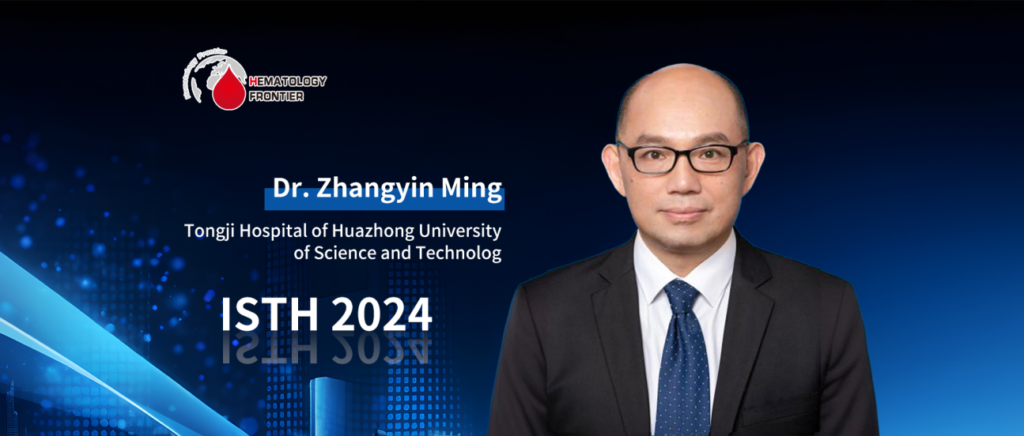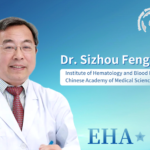
Editor's Note: From June 22 to June 26, 2024, the 32nd International Society on Thrombosis and Haemostasis (ISTH 2024) conference was successfully held in Bangkok, Thailand. At this year's conference, a study by Dr. Zhangyin Ming's team from the School of Basic Medicine, Tongji Hospital of Huazhong University of Science and Technology, explored "The Role of Platelets in Epithelial-Mesenchymal Transition (EMT) and Tumor Metastasis of Cancer Cells in Situ." "Oncology Frontier - Hematology Frontier" invited Dr. Zhangyin Ming to provide an in-depth analysis of the research content. Here is a detailed summary for our readers.Oncology Frontier – Hematology Frontier: This study explores the role of platelets in tumor metastasis. How do platelets influence the epithelial-mesenchymal transition process of cancer cells? What is the significance of this finding for understanding tumor metastasis mechanisms?
Dr. Zhangyin Ming: Current research suggests that platelets protect circulating tumor cells (CTCs) by forming aggregates, shielding them from shear stress and immune surveillance, thus promoting EMT and hematogenous metastasis of tumor cells. Platelets in tumor patients generally exhibit a high activation state. Previous studies have shown significantly elevated levels of P-selectin on platelet surfaces in patients with liver, bladder, and cervical cancers, indicating platelet activation. Platelets contain numerous α-granules and dense granules, releasing substantial contents upon activation, including transforming growth factor-β1 (TGF-β1). Studies indicate that up to 50% of plasma TGF-β1 originates from platelets. Given the highly permeable nature of tumor vasculature, this characteristic greatly facilitates material exchange between tumors and blood.
Based on these observations, our study hypothesizes that platelets play multiple roles in tumor progression. They not only promote CTC survival, EMT, and metastasis through direct contact with tumor cells but also enhance EMT, detachment, and metastasis of cancer cells in situ by releasing substances. In vitro experiments confirmed that platelet release promotes EMT and enhances migration and invasion of tumor cells, with TGF-β1-induced autophagy of tumor cells playing a crucial role in this process. Animal experiments and related studies on patient liver cancer tissues show that platelet-released TGF-β1 promotes autophagy and EMT of tumor cells in situ, thereby facilitating tumor metastasis.
Oncology Frontier – Hematology Frontier: How does autophagy play a role in platelet-promoted tumor metastasis? Does inhibiting autophagy provide a new therapeutic strategy for treating hepatocellular carcinoma metastasis?
Dr. Zhangyin Ming: Autophagy was revealed in the 1950s, and significant progress has been made since its discovery, culminating in a breakthrough in 2016 when Japanese scientist Yoshinori Ohsumi received the Nobel Prize for his outstanding research in the field. Since then, autophagy has become a hot research topic, attracting the attention of numerous scholars.
Research has shown that autophagy can promote EMT by activating the Wnt/β-catenin signaling pathway and degrading the epithelial marker E-cadherin. Other studies report a negative correlation between autophagy marker LC3 and epithelial marker E-cadherin, and a positive correlation with the mesenchymal marker vimentin in liver cancer tissues, indicating that autophagy promotes EMT. Additionally, autophagy can increase tumor cell migration through other pathways. Whether these mechanisms mediate the crucial role of platelets in tumor cell metastasis requires further research and exploration. Many studies confirm that autophagy plays a vital role in promoting tumor cell EMT, inhibiting CTC apoptosis, and enhancing their survival, making autophagy a potential therapeutic target for inhibiting tumor metastasis. Combining autophagy inhibitors may offer a new strategy for preventing tumor metastasis.
Oncology Frontier – Hematology Frontier: How will you further explore the mechanisms of platelet involvement in tumor metastasis? Based on this, can new targeted therapy strategies be developed?
Dr. Zhangyin Ming: Our research shows that TGF-β1 released by platelets promotes tumor metastasis by mediating EMT through autophagy. However, the specific mechanisms of TGF-β1-induced autophagy and autophagy-mediated EMT require further exploration. TGF-β plays crucial physiological roles in wound healing and immune balance. Systemic or global blockade of the TGF-β signaling pathway can lead to severe adverse effects, such as issues in the skin, cardiovascular system, and digestive system. In animal models, targeting TGF-β can cause heart valve disease and squamous cell carcinoma. Our preliminary studies indicate that specific deletion of platelet TGF-β1 does not significantly affect the hemostatic function of platelets or the survival of mice. Thus, targeted intervention of platelet-released TGF-β1 may effectively inhibit tumor metastasis while reducing adverse effects. It is noteworthy that EMT and detachment of tumor cells from in situ tumors are the primary and critical steps of tumor metastasis. In-depth exploration of these inducing factors will further elucidate the complex mechanisms of tumor metastasis.
The tumor microenvironment is a complex system comprising various cellular components. Our study confirms that platelet-released TGF-β1 is an essential part of this system, promoting tumor metastasis. This finding offers new insights, suggesting that widely used clinical antiplatelet therapies could serve as adjuncts to anti-tumor treatments to inhibit tumor metastasis. Combining these with other anti-tumor drugs could significantly improve the treatment outcomes for malignancies like liver cancer.
Dr. Zhangyin Ming
Postdoctoral Fellow, Doctoral Supervisor, Professor of Pharmacology at Tongji Medical College, Huazhong University of Science and Technology. Board Member of the Chinese Pharmacological Society, Executive Member of the Cardiovascular Pharmacology Branch of the Chinese Pharmacological Society, Member of the Biochemical and Molecular Pharmacology Branch of the Chinese Pharmacological Society, Member of the Thrombosis and Hemostasis Professional Committee of the Chinese Physiological Society, Member of the Experimental Pharmacology Branch of the Chinese Association of Traditional Chinese Medicine, and Member of the International Society on Thrombosis and Haemostasis (ISTH). He has led five National Natural Science Foundation projects and one joint fund project of the Ministry of Education, participated in several key projects of the Ministry of Science and Technology, provincial-level projects, and has received the First Prize of the Ministry of Education Science and Technology Progress Award, the Third Prize of Hubei Provincial Natural Science Award, and the First Prize of the 14th Hubei Provincial Outstanding Academic Papers in Natural Science. He was also awarded the Outstanding Postdoctoral Fellow Certificate from the Blood Research Institute of Wisconsin, USA, and was selected as the academic leader of the “Innovation and Entrepreneurship Strategic Team” in Hubei Province. Professor Ming serves as an evaluation expert for the Ministry of Education, a consultant expert for the Center for Drug Evaluation of the National Medical Products Administration, an expert for the Technical Review Center for Medical Devices of the National Medical Products Administration, and a guest reviewer for journals such as the British Journal of Pharmacology, Acta Pharmacologica Sinica, Journal of Thrombosis and Haemostasis, and the Chinese Journal of Pharmacology and Toxicology. He has published over 60 papers in journals such as Blood, Cancer Letters, Hypertension, Thrombosis Research, Cell Death Dis, Acta Pharmacol Sin, and Molecular Nutrition & Food Research.


